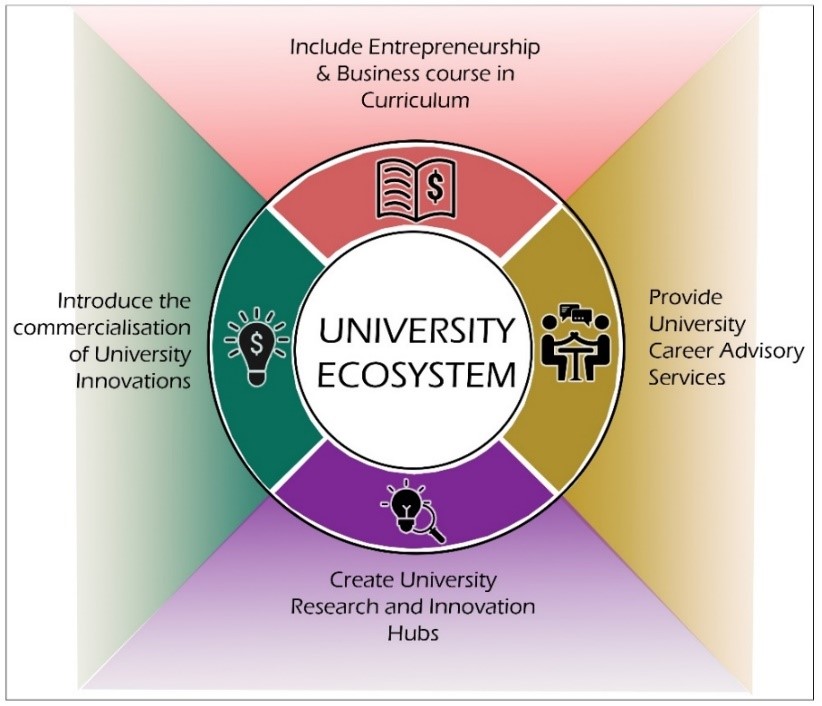Reinventing universities towards entrepreneurship
 Desire Sengoga, Student, Master of Science in Water, Sanitation and Health Engineering.
Desire Sengoga, Student, Master of Science in Water, Sanitation and Health Engineering.
*This post is about research conducted as part of a Master of Science in Water, Sanitation and Health Engineering final project, supervised by Dr Dani Barrington, partnered with Antonella Vagliente of Young Water Solutions*
In 2018 I was selected as a Chevening Scholar from Rwanda. Chevening is a UK Funded Scholarship Programme supporting professionals from all over the world to pursue a one-year master’s degree in any subject at any UK university. As a result, I was admitted at the University of Leeds to pursue a Master’s degree in Water, Sanitation and Health (WASH) Engineering. The program has a strong focus on developing practical and policy skills for addressing critical current and future challenges facing the world, such as climate change, population growth and urbanisation. As an interdisciplinary program, it provides a good understanding on how engineering interventions from water supply, sanitation, hygiene and solid waste management contribute to the protection of public health and the environment. In addition, it is taught by a variety of leading renowned researchers in the industry who have Global South-focussed research projects across the globe.
As part of my degree I carried out a research project looking at supporting young social entrepreneurs from sub Saharan Africa who are providing access to water and sanitation services in their respective communities. This research was conducted in Kenya as a partnership between the University of Leeds, Young Water Solutions and the Jomo Kenyatta University of Agriculture and Technology. In the research the term ‘young’ meant somebody aged 18 to 30 years old and many from this group were university students. Figure 1 provides four ways my research found which universities could contribute in supporting students to become entrepreneurs in their respective fields of specialisation, particularly WASH.

Figure 1: University Entrepreneurship Development Model
- Teaching Entrepreneurship and Business Courses
In the course of my research I found that teaching entrepreneurship and business courses to non-business students as part their curriculum can help them develop entrepreneurial attitude and skills. This results in students being open to starting their own enterprises from what they study, and graduates with entrepreneurial skills were found to be more employable. Through these courses, students are helped to realize how what they study relates to the existing challenges in their respective communities and globally. Second, my research recommends that these courses should be taught by lecturers with backgrounds in entrepreneurship. Lastly, students should be given opportunities to carry out experiential projects and field visits so that they can apply what they study and not only have entrepreneurial theoretical knowledge.
- University Career Advisory Services
Career advisory services play a key role in supporting university students, mostly to increase their employability competences and provide networks linking students with companies seeking employees. However, this same unit can also be used to help students with enterprise aspirations to grow their understanding and capacity regarding enterprise and business development. This can be done through organising talks, career fairs and innovation competitions to help students grow and apply their entrepreneurial capacity through specialized training in sales and marketing, business planning and basic accounting and finances. These services also could help students understand the legal systems governing the business sector in their respective country.
- University Research and Innovation Centers
Universities are known for conducting millions of pounds of research every year, much of which could produce innovations providing solutions to existing challenges in society. These centres could provide students and university researchers with a platform for prototyping their innovations, and if successful the centres could provide an Intellectual Property (IP) service, protecting them from being stolen or duplicated. For this to happen more funding from both public and private sectors dedicated to research challenges faced by communities.
- Commercialisation of University Innovations/Technology Transfer
Finally, innovations from universities can also be commercialized to the public and private sectors. Through this universities can facilitate technology and knowledge transfer from their research and innovation centres to help companies use them to grow and improve the quality of their products and services. Secondly, through this universities can make more money and increase their revenues. This contributes to the local economy, and this money can be reinvested in attracting more talent and building more robust infrastructure for their research and innovation centres.
In short, based on the four above approaches universities can be reinvented and restructured to allow themselves to become hubs for entrepreneurship development. This could benefit their students and the universities themselves whilst contributing to the local economy through developing innovations that provide solutions to the existing challenges in our communities.
